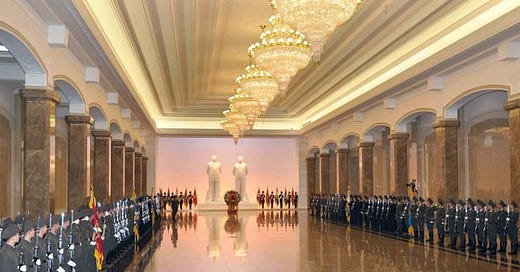Visiting the most bizarre nation on earth
The opening of a new North Korean tourist zone prompts memories of posing as a tourist while attempting to report from there
Many people have inexplicably overlooked the prospect of a summer holiday at the newly opened Wonsan-Kalma eastern coastal tourist zone in North Korea. It offers accommodation for some 20,000 visitors and all manner of shiny new facilities.
Admittedly there are a number of problems for foreign visitors, starting with the difficulty of obtaining entry to the People’s Democratic Republic of Korea unless you are Chinese or Russian. Then there are the logistics of getting to a country with just one wonky railway line linking it with China and practically no international flights.
But, above all, is the more salient question of why on earth anyone would want to visit North Korea in the first place? I am among a rather small number of people who have made the trip and can confirm that it is an experience of a lifetime, albeit not for the feint-hearted.
In 1997, when I was working for The Independent and my friend Catherine Field was working for The Observer, we convinced our respective publications that a trip to this notoriously reclusive dictatorship was a good idea even though we were compelled to pose as tourists.
Suffice to say that although we were allowed in, the paper thin pretence of a tourist visit lasted for nano-seconds and our every movement was closely supervised by two minders. Our rooms in the large and brutalist Koryo Hotel were searched and bugged, if there was the option of another place to stay, it was never offered.
Even getting there was an intensely scarry enterprise because it involved flying from Beijing to Pyongyang on Air Koryo, at the time the only airline making the trip. The extremely old and battered Soviet-era plane was so ancient that the seats did not seem to be securely attached to the floor and as soon as it landed fire engines were dispatched to spray the dangerously bald tires to prevent them from exploding. On the spot we decided to return by train.
However we did get in and, although I have visited all manner of dubious places, I can unequivocally say that I have never visited a more bizarre or claustrophobic country.
Tourists are presented with a tightly curated itinerary designed to show off the best, such as it is, while rigorously ignoring the worst. On the only occasion we managed to wriggle away of our minder’s surveillance we got to see what was in local food shops which turned out to have more or less nothing to sell in sharp contrast to a department store on the official itinerary which was filled with various types of unattractive goods, but notably free of customers.
There are a number of fixed sites which are compulsory for visits of this kind. Top of the list is the shrine to Kim Il Sung, founder of PDRK and grandfather of the current ruler. You are strongly encouraged to purchase a bouquet of sad looking flowers to be solemnly laid in tribute.
This quite extraordinary edifice is best described as kitsch on steroids. The primary colour is pink, the array of statues and portraits of the nations’ ‘Eternal President’, renders Donald Trump’s face paint as weirdly natural in comparison. We particularly liked the carefully preserved display of gifts given by visiting dignitaries, some less dignant than others, including Arthur Scargill, the British miners’ union leader.
The vast hall, festooned with plastic flowers, was frankly ludicrous, so much so that we barely dared look at each other fearing an outburst of mirth; instead we screwed up our faces to the extent of tearfulness, prompting our minders to congratulate us on such a sincere display of being overcome by emotion.
A visit to the border with South Korea was also instructive, a grim place with stern looking guards patrolling both sides but rather more visitors on the Southern perimeter where a prosperous and democratic nation thrives much to the annoyance of the folk where we were. Both sides looked more than ready to respond to the smallest infraction of the rules of engagement.
Aside from the sites, there was a visit to a classroom of well drilled small children but zero chance of unsupervised contact with local people. Glimpses of the populace, only really possible on the very slow moving train chugging up to the Chinese border, revealed big groups of emaciated people standing on railway platforms with, so it appeared, no other occupation other than to watch the iron-clad moving escape route trundle out of the country.
When the train crossed the border at Dandong into China there was a great feeling of relief. I had never previously experienced such a sensation because as a journalist visiting the People’s Republic, I was more accustomed to experiencing tension and trepidation but relativity made its mark that day.
So, some things to think about before planning a visit to the resorts of Wonsan-Kalma. But there might come a day when North Korea opens up but that probably requires regime change. As matters stand there are no evident signs of this ghastly regime starting to falter but it is reasonable to wonder how long they can keep it up.





Steve, your still vivid memories of that trip are testament to its authoritarian kitsch😹